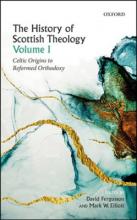David A. S. Fergusson and Mark W. Elliott, eds., The History of Scottish Theology, Volume I: Celtic Origins to Reformed Orthodoxy (Oxford: Oxford University Press, 2019)
Fergusson, David A. S., and Mark W. Elliott, editors. The History of Scottish Theology, Volume I: Celtic Origins to Reformed Orthodoxy. Oxford: Oxford University Press, 2019
History of Scottish Theology
This three-volume work comprises over eighty essays surveying the history of Scottish theology from the early middle ages onwards. Written by an international team of scholars, the collection provides the most comprehensive review yet of the theological movements, figures, and themes that have shaped Scottish culture and exercised a significant influence in other parts of the world. Attention is given to different traditions and to the dispersion of Scottish theology through exile, migration, and missionary activity.
The volumes present in diachronic perspective the theologies that have flourished in Scotland from early monasticism until the end of the twentieth century. The History of Scottish Theology, Volume I covers the period from the appearance of Christianity around the time of Columba to the era of Reformed Orthodoxy in the seventeenth century. Volume II begins with the early Enlightenment and concludes in late Victorian Scotland. Volume III explores the 'long twentieth century'. Recurrent themes and challenges are assessed, but also new currents and theological movements that arose through Renaissance humanism, Reformation teaching, federal theology, the Scottish Enlightenment, evangelicalism, mission, biblical criticism, idealist philosophy, dialectical theology, and existentialism. Chapters also consider the Scots Catholic colleges in Europe, Gaelic women writers, philosophical scepticism, the dialogue with science, and the reception of theology in liturgy, hymnody, art, literature, architecture, and stained glass. Contributors also discuss the treatment of theological themes in Scottish literature.
Volume 1: Celtic Origins to Reformed Orthodoxy
Straddling over a millennium of theological work, these essays explore the beginnings of Scottish theology from the time of the Columban church through monasticism to the era of medieval scholasticism, and then from the Reformation (1560) to later traditions of Reformed orthodoxy until c.1700. Well-known figures including Scotus, Richard of St Victor, John Mair, John Knox, Andrew Melville, Samuel Rutherford, and Henry Scougall are explored, while attention is also devoted to the ways in which Scottish theology was connected to philosophy, law, politics, church life, and patterns of spirituality. The period under review includes the foundation of five Scottish universities in St Andrews, Glasgow, Aberdeen (King’s and Marischal), and Edinburgh. The influence of Reformed confessions, particularly the Westminster Confession (1646), is treated in several essays both as a standard of uniformity and a source of controversy. Throughout the volume, the multiple connections with Europe and other parts of the British Isles are evident through exile, dispersion, international debates, and institutional links.
Items in bold explicitly engage Torrance.
1. "Scottish Theology," David Fergusson and Mark W. Elliott, 1-11
2. "Theology in Scotland before Scholasticism," Thomas O’Loughlin, 12-24
3. "Richard of St Victor," Lydia Schumacher, 25-38
4. "Adam of Dryburgh," Peter Damian-Grint, 39-53
5. "Liturgical Theology before 1600," Stephen Mark Holmes, 54-68
6. "Duns Scotus," Richard Cross, 69-80
7. "John Ireland and the Transformation of Scotist Theology," Simon J. G. Burton, 81-95
8. "John Mair as Theologian," John T. Slotemaker, 96-108
9. "Sixteenth-Century Philosophy and Theology after John Mair," Giovanni Gellera, 109-123
10. "John Knox and Andrew Melville," Euan Cameron, 124-143
11. "Political and Ecclesial Theology in the Sixteenth Century," Mark W. Elliott, 144-159
12. "The Bible in Sixteenth-Century Scotland," Iain R. Torrance, 160-172
13. "Habit and Belief in the Early Scottish Reformation," Martin Holt Dotterweich, 173-188
14. "Reformed Theology in Confessions and Catechisms to c.1620," Ian Hazlett, 189-209
15. "Spiritual Theology in Bruce, Howie, Johnston, Boyd, and Leighton," Mark W. Elliott, 210-224
16. "Federal Theology from the Reformation to c.1677," David G. Mullan, 225-237
17. "The Covenant Idea in Mid-Seventeenth-Century Scotland," Guy M. Richard, 238-252
18. "The Reformed Scholasticism of James Dundas," Alexander Broadie, 253-264
19. "The Theology of the Westminster Confession of Faith in its Context," Whitney G. Gamble, 265-278
20. "The Aberdeen Doctors and Henry Scougal," Aaron Clay Denlinger, 279-295
21. "Episcopalian Spirituality," Marie-Luise Ehrenschwendtner, 296-311
22. "Early Modern French and Dutch Connections," James Eglinton, 312-327
23. "Early Modern Jurisprudence and Theology," Thomas M. Green, 328-341
24, "The Marrow Controversy," Stephen G. Myers, 342-358
25. "Boundaries of Scottish Reformed Orthodoxy, 1560–1700," R. Scott Spurlock, 359-376
Index of Names
James Torrance: 247-249
Thomas F. Torrance: 2, 4, 35, 146, 171, 190, 193-195, 200-201, 217, 229n, 235, 279, 282-283, 286, 362, 365
- 39 views

